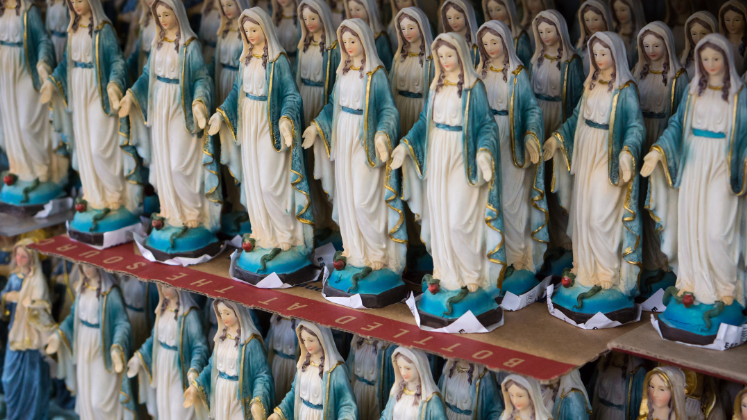Does religion make us happier? In this post, Muhammad Zainuddin explores the intriguing relationship between religion, tolerance of uncertainty and levels of well-being.
Don’t worry just yet, but do take a look at the two maps below: Figure 1: Medium-High responses to “How important is god in your life” and Figure 2: Medium-High responses to “How satisfied are you with your life as a whole these days?”


Notice anything interesting?
Both maps were created using responses to two questions from the World Values Survey (2010-14) and only include countries with medium-high scores. The two maps attempt to illustrate the religiosity (Figure 1) and subjective well-being (Figure 2) of countries around the World.
At a glance, they look similar, but religion isn’t the only thing that influences a country’s subjective well-being. Surely it’s just a coincidence, right?
Tolerance for uncertainty avoidance
Rather than just a coincidence, there may be more to the relationship than what is apparent at first glance. You see, countries that score highly for both religiosity and life satisfaction almost always score highly in uncertainty avoidance (UAI), one of Hofstede’s six cultural dimensions. This is defined as how threatened or uncomfortable the members of a culture feel by uncertainty or ambiguity.
In fact, correlational research showed that uncertainty avoidance moderates the relationship between religion and well-being. Essentially, religion positively affects well-being (for both low and high UAI countries), but this is dependent on uncertainty avoidance, such that in countries with higher uncertainty avoidance scores, (i.e. countries where the population feels more threatened by uncertainty) religion significantly predicts higher well-being.
Why?
We can try and explain this intriguing interaction between religion, uncertainty and wellbeing using the help of two very different countries, with very similar levels of wellbeing: Pakistan and Sweden.
Pakistan and Sweden are extremely culturally (Rieger, Marc & Wang, Mei, 2012) and psychologically different (cultural distance of 0.3998) countries. In addition, they vary greatly in terms of development (0.557 vs 0.945 HDI) and have vastly different levels of religious importance in their populations (94% vs 10%). Yet, they both have strikingly similar, high life satisfaction scores (7.54 vs 7.55, measured 1-10).
But how do such vastly different countries end up with effectively the same life satisfaction scores? A potentially crucial explanatory factor may be the stark difference in their uncertainty avoidance (Pakistan has a UAI score of 70 vs Sweden’s 29 (see Hofstede), So, why is it that uncertainty avoidance seems to play such a substantial role for the subjective well-being of Pakistanis and not for the Swedish? The answer lies in how they control for the constant uncertainty we have as humans.
Religion and Uncertainty
Before we can understand the moderated relationship as a whole, we need to understand religion, uncertainty and their interaction.
Religions are powerful social groups. They create ideological systems that provide us with existential purpose and a set of normative guidelines of how we should live our lives.
Uncertainty isn’t always bad. It can either be an exciting prospect that is satisfying to resolve, or a stressful and anxiety-inducing unknown that strips us of our control – think a nail-biting sports match vs exam results day.
Uncertainty also comes in different forms. Personal uncertainty – doubting who you are, and your worldviews, and informational uncertainty – uncertainty in your judgements and decisions as a result of insufficient information. Anxiety-inducing uncertainty can take away our control, but religions (and, by extension, institutions) provide systems that allow us to regain control. Religion helps us adapt to uncertainty. It would therefore follow that by reducing anxiety-inducing uncertainty through religious adaptation, you could improve the well-being of the population.
So, how do we Pray Uncertainty Away?
The AREA model can explain how we use religion to adapt to (informational) uncertainty and improve our well-being. The model explains that we Attend to relevant events that are unexplained (events that cause uncertainty), React emotionally to them, Explain or understand them, and resultantly Adapt to them. Religion unfailingly provides explanations for even the most unexplainable events like our existence, and thus facilitates adaptation to the threat of uncertainty they pose. For example, Pakistani citizens use religious ideology to explain away the innumerate, worrying uncertainties they face on a daily basis. They thus reduce their anxiety and maintain high well-being, in contrast to the ‘chill’, relatively low UAI Swedish population.
Uncertainty-Identity theory, (a variant of social identity theory) explains that to reduce personal uncertainty, identifying yourself with groups, is a very effective strategy. This is exceedingly so for highly entitative ones; groups with distinct structures and boundaries, uniformity, and common goals. So, religion can combat personal uncertainty; encouraging the grouping together of people into highly entitative in-groups, especially so, in tight, collectivist cultures (interdependent, highly normative cultures) like Pakistan.
Compensatory control theory can further substantiate religion’s role in adapting to uncertainty, elucidating the strange likeness of Pakistan and Sweden’s well-being scores. As we know, uncertainty causes anxiety by diminishing our sense of control. So, compensatory control theory explains that we compensate for this reduction of control by searching for it in ‘structure’. This is irrespective of whether this ‘structure’ results in other harmful outcomes, or if it’s even related to what is causing the uncertainty. Our starring cultures of Pakistan and Sweden and their distinct differences give us quintessential examples of the interaction between religion and compensatory control theory: Pakistani institutions would be one of the last things many Pakistanis would look towards for control. Thus, the unyielding norms and practices of religion present a much more attractive structure to appeal to in order to regain control, reduce anxiety and consequently improve well-being. The Swedish on the other hand, may not need to look twice to find structure in their dependable institutions (think Ikea). They don’t need to worry as much about uncertainty, ensuring their well-being stays high.

So, religions (and institutions) can help us adapt to uncertainty and reduce its associated anxiety, consequently explaining their positive effect on well-being. But, in many developed countries, there’s a ‘religion paradox’: If religion has a positive effect on subjective well-being, why are so many people leaving it? Lower uncertainty avoidance scores could actually help explain this paradox. As we saw when applying Sweden to the above theories; if developed countries aren’t threatened by uncertainty, their people can achieve well-being, without needing to rely on religion!
I hope that these two countries and three theories were able to shed light on the intriguing interaction between religion and uncertainty. It improves our understanding of uncertainty avoidance and how it influences the relationship between the religiosity and well-being of countries.
However, if you still can’t provide any answer as to why such different countries like Pakistan and Sweden, have such similar life satisfaction scores, I can’t help you.
But, God can (if you’re really uncertain, that is)!
Notes
- The views expressed in the post are of the author and not the Department of Psychological and Behavioural Science nor the London School of Economics and Political Science (LSE).
- This blog post was originally written as part of PB101: Foundations of Psychological Science, a compulsory course on the BSc Psychological and Behavioural Science programme in the Department of Psychological and Behavioural Science at LSE. It has been published with the permission of the author. Visit the PBS website for more information on studying in the department: https://www.lse.ac.uk/PBS/Study.
- Image 1 by Abdullah Shakoor on Pixabay.
- Image 2 by Kenji Rikitake on Unsplash.
References
- Figure 1 & 2: Inglehart, R., C. Haerpfer, A. Moreno, C. Welzel, K. Kizilova, J. Diez-Medrano, M. Lagos, P. Norris, E. Ponarin & B. Puranen et al. (eds.). 2014. World Values Survey: Round Six – Country-Pooled Datafile Version: https://www.worldvaluessurvey.org/WVSDocumentationWV6.jsp. Madrid: JD Systems Institute.\




